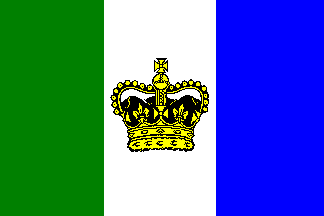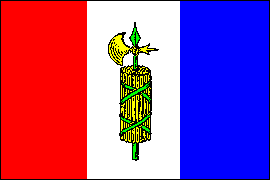
Nusquama
Somewhere in the Third Hemisphere lies Nusquama: a warm, sunny country, with dry summers and rainy winters. Its clear, bright skies and long, clean beaches have made tourism one of the major industries. About a third of the country is mountainous and given over to pasturage for sheep and goats. There are few forests, but many groves of olive, fig, and citrus trees. Wine and cheese for gourmands, plus movies, TV shows, comic books, and pornography (in all media) for the masses, are the major exports.
The modern history of Nusquama began with a revolution that kicked out the royal court and stripped the Church and nobility of their power and privileges. Chaos ensued: the new government was torn by internecine strife, a thousand written constitutions were drafted but none were enacted, and the government -- such as it was -- lurched from one shift and expedient to another. The only thing the Revolutionaries could agree on was that they didn't want the old order back; and accordingly the Revolution in turn was overthrown, but the old order was not re-established.
Instead, General Frederic de Narbondo stepped in, dismissed the Provisional Government, dissolved the Estates-General, assumed the title of Regent, and consolidated all the gains of the revolution -- except for democracy.

The First Regency, or Epoca Narbondona, was a time of peace, prosperity, and stultifying authoritarianism. A rational and even-handed law code was promulgated; careers were open to talent; the currency was sound; taxes were low; public works improved the infrastructure and glorified the state; but dissent was repressed. "Order and progress" were the watchwords of the regime.
De Narbondo created a Senate, a consultative rather than legislative body, originally filled with his own appointees. Over time, however, vacancies were filled by election on the basis of a very restricted franchise; and as the Regent's energies and faculties faltered, he deferred to it increasingly. It was to this Senate that the choice of a new Head of State fell after the Regent's death.
The Court returned from exile, and there was a Legitimist party that wanted to re-establish the old royal line and the old order, and championed the Pretender, Prince Joan de Randolfo, called the Mad, who had not set foot in Nusquama since he was a boy. He was willing (at least to start with) to share power with the Senate, but insisted on raising the purple-and-gold flag of the monarchy, which was just too much. In the end (being a congenital eunuch) he died without issue; now the Legitimists are a tiny clique who call themselves the Traditionalist Conservatives.
Instead, a Moderate faction of royalists was able to establish a constitutional monarchy under a cadet line. These relatives of the Prince de Randolfo were close enough to a have a tenuous claim to the throne, but distant enough to have stayed in Nusquama and even prospered after the Revolution. The Moderate royalist party championed Princess Gloria, whom the Legitimists derided as a "nitwit and sexpot," but who was very popular, and all agreed that she would make an excellent figurehead -- especially after she literally wrapped herself in the flag of the Regency.

In sharp contrast to the expatriated Pretender, Gloria had been born and raised in Nusquama during the Epoca Narbondona. Though connected by marriage to Sweven, a foreign (but constitutional) monarchy, her Prince-Consort, Osgood, adapted well to la vita douÁ: he spoke la lingua romanesca fluently, preferred Nusquaman wine and brandy to Swevenian mead and cider, and was a generous patron of the arts.
The effective Head of Government was a Primer, nominated by the Princess with the approval of the Senate. The Senate was mostly divided between two parties: the Moderates, who had hitherto stood against the rigid Legitimists, now stood against the pushy Democrats, gradually implementing more liberal and democratic reforms. In the wings, the Regency as an institution still had its champions, called Narbondonians, though latterly it was proposed that the office be filled by election. The three parties were also called the Rein, or Kingdom; the Poplar, or People; and the Natio, or Nation.
The early Epoca Gloriana was a time of flourishing in all the arts, and strange religious cults appearing out of nowhere. A Republican opposition was born, though at first it seemed as politically irrelevant as the Legitimists -- though a perverse kind of antiquarianism gave the latter a new cachet. In the later years, however, all this idealism yielded to gross materialism. Speculation and peculation, both private and public, ended in a financial crisis. In the tumult of the time, the Moderate royal regime collapsed ignominiously, and the parliamentary Republic was founded.

The Republicans came to power with a written Constitution already in hand, hammered out over the generations since the collapse of the Estates-General, though as yet untested in practice.
The legislature, in this Constitution, has two chambers: the Centumviri, or Hundred, and the Quinquagintaviri, or Fifty. The Hundred are elected at large by proportional representation, so that a party gets one seat for each percent of the vote. The Fifty are representatives of each of the fifty districts into which the country is divided. These districts are roughly equal in population, and when one gets too big or too small it is divided according to a complex formula. The districts are not at all self-governing: they are administered by Prefects appointed by the central government. Representatives in the Fifty must have a majority, so runoff elections are held between the two leading contenders; this forms large coalitions and counterbalances the proliferation of parties fostered by PR.
The executive branch of government is headed by the Triumvirate: the Director, responsible for civil administration; the Protector, responsible for foreign policy and commander-in-chief of the armed forces; and the Ordinator, responsible for domestic law and order. The Triumvirate is elected at large, and as with the Fifty, runoffs are held to ensure that the winners receive a clear majority.
Both the legislature and the Triumvirate are elected for four-year terms. Elections are held every other year, either for the legislature or the executive.
Under this Constitution, and its new flag, the Republic restored public solvency and general probity. The Republicans then split between the Conservative and the Radical factions. In time, moreover, a new generation of democratic movements was born: the Socialist Party, the anarcho-syndicalist Unio General de lo Lavore, the Christian Democratic Party and l'Unio Social Catolica, various nationalist leagues and their paramilitary auxiliaries (li Rambontiosi, "the Rambunctious Ones": l'Attio Nusquamana, il Falanç, li Fasci Combatanti, la Sinarchia, li Sindicalisti Nationali, etc.). Subsequently, the regime was destabilized by the rising power of the extremist forces at either end of the spectrum.
This polarization culminated in the crisis of the Civil War, in which the Republic broke down. Once again, order was restored through military intervention -- by an Admiral this time, viz. Nicolas de la Hortia. After decimating the extreme Left and reining in the extreme Right, the second self-proclaimed Regent ended his period of emergency rule with a plebiscite to legitimize his regime and grant him constitutional authority, and he finally handed over power to a successor, personally selected but then generally approved.
Under l'Estat Novel, there is a Cambra de Delegatos: two for each of the fifty districts, elected one at a time, every two years, for four-year terms; and a quasi-representative Cambra de Corporationes, appointed by the Regent in consultation with the Primer, who is elected by the Delegati. The Regent himself is elected for a seven-year term (popularly, directly, and with provisions for a runoff to ensure a majority). Taking a lesson from the Prince de Randolfo and Princess Gloria, the Republican flag has been retained by the new regime.
© 2011 by Karl Jahn